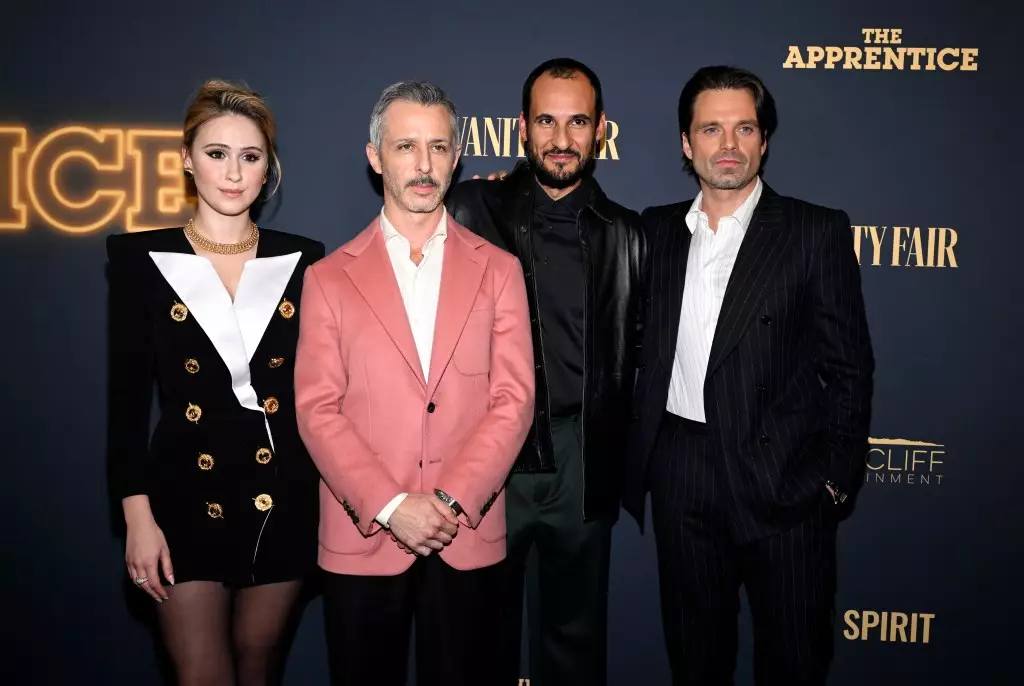The release of Ali Abassi’s film, *The Apprentice*, has emerged as a significant cultural event, marked by both critical acclaim and a backdrop of controversy. Premiering at the DGA Theater in New York City, the film narrates the early years of Donald Trump, with Sebastian Stan portraying the complex character under the mentorship of Roy Cohn, played by Jeremy Strong. The film’s journey to this premiere was anything but straightforward, involving disputes with its original financiers and legal threats from Trump’s legal team. This article delves into the film’s production challenges, the nuanced portrayal of Trump, and the larger implications these elements carry within today’s political climate.
The announcement of the film’s theatrical release was met with celebrations from its producers, particularly James Shani of Rich Spirit. His enthusiastic remarks highlighted the struggles leading to this moment: “We did it. I don’t know how many of you guys know what it took to get here.” The project, which began under Kinematics—a production company backed by Trump supporter Dan Snyder—hit a wall when the financier decided to withdraw backing, leading to substantial delays and uncertainty.
This tumultuous backdrop accentuates the film’s critical perspective on Trump’s history. With the original distribution halted and cease-and-desist letters flooding in from Trump’s attorneys, *The Apprentice* found itself in limbo post-premieres at prestigious festivals such as Cannes and Toronto. The emergence of Tom Ortenberg’s Briarcliff Entertainment as the film’s savior underscores a critical aspect of Hollywood: the necessity of courage when dealing with polarizing political figures. As Shani noted, it is tragic that a seasoned professional had to face substantial risks to bring this film to light, reflecting broader themes of fear and censorship within the entertainment industry.
At the heart of *The Apprentice* lies a compelling portrayal of Donald Trump, who, in Abassi’s vision, emerges as a multifaceted character—charming yet deeply flawed. This duality, explored through Stan’s performance, illustrates how the film seeks to depict Trump beyond mere caricature. Abassi’s insistence that he refrains from viewing politics through a binary lens is significant; he prefers to see political figures as human beings, with both admirable traits and grave shortcomings.
This perspective challenges audiences to confront the complexity of public figures rather than relegating them to simplistic narratives. In a pivotal scene, the film showcases a troubling interaction between Trump and his then-wife, Ivana, played by Maria Bakalova. Abassi’s decision to draw from real-life depositions adds layers to the portrayal, though it invites substantial critique. As he stated, “If we hold up a mirror… that image is not going to go away.” This sentiment is particularly resonant, considering the current debates surrounding accountability and the perception of truth in relation to political prowess.
The film’s reception has not been without its contentious debates. Abassi himself pointed out the irony in labeling the depiction of Trump as “controversial,” especially in light of past allegations of sexual misconduct that have already been substantiated in civil court. Instead of shying away from difficult themes, Abassi leans into them, suggesting that artistic representations of uncomfortable truths perform an essential role in society’s reflection on power dynamics and personal morality.
This becomes crucial at a time when the line between creative expression and ethical consideration is being heavily scrutinized. The narratives we construct around influential figures are reflective of societal values. Abassi’s work prompts viewers to question the parameters of acceptability in storytelling, particularly regarding those who wield power. The expectation that filmmakers must sanitize their content to avoid backlash is a point of contention that *The Apprentice* expertly navigates.
As *The Apprentice* gears up for its wide theatrical release, the film is not only a portrayal of an American mogul’s journey but also a society’s dialogue with its own past and present. The hurdles faced during its production and the contentious reaction to its content illustrate a critical examination of our cultural narratives. Abassi’s choice to explore Trump’s complexities forces the audience to grapple with their interpretations of power, influence, and morality. The film serves as a reflection of our world, unearthing uncomfortable truths and inviting conversations that are essential in understanding the societal framework we inhabit. In a time rife with division, the narrative of *The Apprentice* stands as a poignant reminder of the stories that demand to be told, regardless of their controversial nature.
